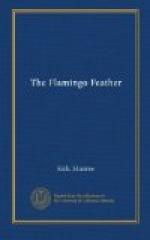After Chitta struck Has-se the blow that stretched him stunned and bleeding on the ground, he sprang into the forest, and gliding swiftly among the stately trunks of the solemn pines, made his way to the river. On its bank were drawn up many canoes, over which Chitta glanced hastily, but with a practised eye. In a moment he selected one that promised to combine lightness with speed, noiselessly launched it, and stepped into it. Grasping a paddle, he headed the stolen craft down the river, and was quickly buried in the mist that rose from its surface.
As the unhappy lad pursued his solitary way down the river, neither knowing nor caring where he was going, so long as he placed distance between himself and those whom he knew would shortly search for him, his mind was filled with bitter reflections. He felt as though he hated all men, but especially Has-se and the white lad, who, he felt certain, had taught the former the trick of wrestling, by means of which the games had been won.
In destroying the great storehouse, with its winter’s supply of provisions of his tribe, his desire had not been so much to injure his own people as the white men, whom he knew were also dependent upon it for food, and of whom Has-se’s friend was one who would thus suffer. He had thought to escape detection after committing this wicked act, and that the fire would be supposed to be the result of an accident. This hope had been dashed by the unexpected appearance of Has-se, who had overheard his muttered threats; and now he knew that he must be an outlaw from his tribe forever, and that he would meet with a terrible punishment if he ever fell into their hands.
Of all his bitter thoughts the one uppermost in his mind was the desire for revenge upon the gentle but high-spirited Has-se, who had not only won from him his coveted position, but against whom he had just struck such a cruel and cowardly blow.
This is the way of the world, with white as well as with red men, and with boys and girls as well as with grown people. The more we injure a person, the more bitter do we feel against him; and the more we help and do good to him, the more kindly do we feel towards him.
The deep scowl of hate had not left Chitta’s face when he ran his canoe ashore at the foot of the high bluff upon which Admiral Ribault had erected the stone pillar engraved with the French coat of arms. Securing his canoe, and carefully concealing it from those who might pass on the river, Chitta made his way, by means of a narrow path through the tangled underbrush, to the summit. From here, by daylight, he would command a view of the river for miles in either direction, and would be able to detect the approach of any who should come in search of him while yet they were a long way off.
As it was still night, and nothing was now to be seen except what was disclosed by the moon, the young Indian gathered together a small heap of moss and leaves, and drawing his robe over his head, flung himself down for a few hours’ sleep.




